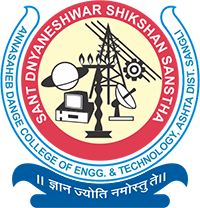Vision and Mission of the Institute
Institute Vision:
-
To be a leader in producing professionally competent Engineers.
Institute Mission:
We, at Annasaheb Dange College of Engineering & Technology, Ashta, are committed to achieve our vision by,
-
Imparting effective outcome-based education.
-
Preparing students through skill-oriented courses to excel in their profession with ethical values.
-
Promoting research for the benefit of society.
-
Strengthening relationships with all stakeholders.
Vision and Mission of the Department
Department Vision:
-
To develop graduates in the field of Civil Engineering with pre-eminence on technical competency, research, employability, entrepreneurial skills, and ethics.
Department Mission:
We, at the Department of Civil Engineering, are committed to achieve our vision by,
-
M1.Providing consistent activities and programs for promoting academic excellence.
-
M2.Preparing students to serve the society with professional ethics.
-
M3.Encouraging the students for research, innovation, and higher education.
-
M4.Strengthening relationship with stakeholders for overall development of the department.
Programme Educational Objectives (PEOs)
Graduates of Civil Engineering Department will able to :
PEO-1 : Apply acquired skills in developing safe, sustainable, economical, and environmentally sound solutions to Civil Engineering problems.(Domain Knowledge)
PEO-2 : Demonstrate technical competency by solving problems in diverse areas of Civil Engineering.(Core Competency)
PEO-3 : An ability to engage in lifelong learning for effective adaptation of technological developments.(Lifelong Learning)
PEO-4 : Display leadership skills at workplace and function ethically in the professional world. (Professionalism).
PROGRAM OUTCOMES (POs)
PO-1 Engineering knowledge : Apply the knowledge of mathematics, science, engineering fundamentals, and an engineering specialization to the solution of complex engineering problems.
PO-2 Problem analysis : Identify, formulate, review research literature, and analyze complex engineering problems reaching substantiated conclusions using first principles of mathematics, natural sciences, and engineering sciences.
PO-3 Design/development of solutions : Design solutions for complex engineering problems and design system components or processes that meet the specified needs with appropriate consideration for the public health and safety, and the cultural, societal, and environmental considerations.
PO-4 Conduct investigations of complex problems : Use research-based knowledge and research methods including design of experiments, analysis and interpretation of data, and synthesis of the information to provide valid conclusions.
PO-5 Modern tool usage : Create, select, and apply appropriate techniques, resources, and modern engineering and IT tools including prediction and modeling to complex engineering activities with an understanding of the limitations.
PO-6 The engineer and society : Apply reasoning informed by the contextual knowledge to assess societal, health, safety, legal and cultural issues and the consequent responsibilities relevant to the professional engineering practice.
PO-7 Environment and sustainability : Understand the impact of the professional engineering solutions in societal and environmental contexts, and demonstrate the knowledge of, and need for sustainable development.
PO-8 Ethics : Apply ethical principles and commit to professional ethics and responsibilities and norms of the engineering practice.
PO-9 Individual and team work : Function effectively as an individual, and as a member or leader in diverse teams, and in multidisciplinary settings.
PO-10 Communication : Communicate effectively on complex engineering activities with the engineering community and with society at large, such as, being able to comprehend and write effective reports and design documentation, make effective presentations, and give and receive clear instructions.
PO-11 Project management and finance : Demonstrate knowledge and understanding of the engineering and management principles and apply these to one’s own work, as a member and leader in a team, to manage projects and in multidisciplinary environments.
PO-12 Life-long learning : Recognize the need for, and have the preparation and ability to engage in independent and life-long learning in the broadest context of technological change.
PROGRAM SPECIFIC OUTCOMES (PSOs)
PSO-1 : An ability to get acquainted with the contemporary trends in civil engineering and thereby demonstrate proficiency in the fields of structural health monitoring, Remotes Sensing, GIS and GPS, Construction technology, and management.
PSO-2 : Understand and provide solutions to issues faced during professional practice such as the procurement and interaction with stakeholders during the construction phase of the work.

